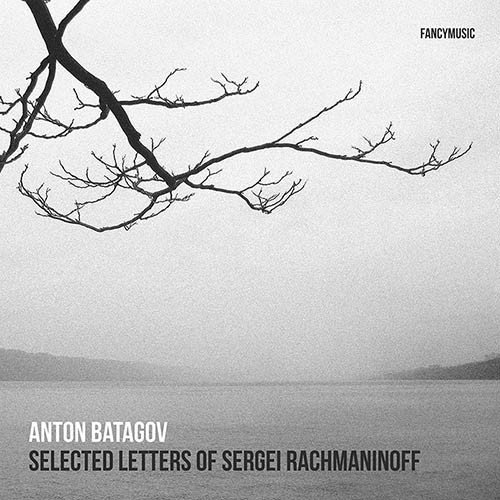
Anton Batagov - Selected Letters of Sergei Rachmaninoff (2013)
BAND/ARTIST: Anton Batagov
- Title: Selected Letters of Sergei Rachmaninoff
- Year Of Release: 2013
- Label: FANCYMUSIC
- Genre: Modern Classical, Minimalism
- Quality: FLAC (tracks)
- Total Time: 78:44
- Total Size: 228 Mb
- WebSite: Album Preview
Tracklist:
01. At the Grave of Sergei Rachmaninoff (Kensico Cemetery, Valhalla, NY)
02. Letter from Sergei Rachmaninoff to Simeon ten Holt
03. Letter from Sergei Rachmaninoff to Peter Gabriel
04. Letter from Sergei Rachmaninoff to Arvo Part
05. Letter from Sergei Rachmaninoff to Ludovico Einaudi
06. Letter from Sergei Rachmaninoff to Philip Glass
07. Letter from Sergei Rachmaninoff to Wim Mertens and Niccolo Paganini
08. Letter from Sergei Rachmaninoff to Brian Eno
09. Letter from Sergei Rachmaninoff to Vladimir Martynov
10. At the Grave of Sergei Rachmaninoff. Postlude
Performers:
Anton Batagov, piano
01. At the Grave of Sergei Rachmaninoff (Kensico Cemetery, Valhalla, NY)
02. Letter from Sergei Rachmaninoff to Simeon ten Holt
03. Letter from Sergei Rachmaninoff to Peter Gabriel
04. Letter from Sergei Rachmaninoff to Arvo Part
05. Letter from Sergei Rachmaninoff to Ludovico Einaudi
06. Letter from Sergei Rachmaninoff to Philip Glass
07. Letter from Sergei Rachmaninoff to Wim Mertens and Niccolo Paganini
08. Letter from Sergei Rachmaninoff to Brian Eno
09. Letter from Sergei Rachmaninoff to Vladimir Martynov
10. At the Grave of Sergei Rachmaninoff. Postlude
Performers:
Anton Batagov, piano
Listening to this album, I hear all the threads of post-modern composition and voicing re-cast for piano, which is the most staid and straightforward of all the instruments, but through that lens we 'see' a new, underlying truth, which is the link between the past and the present. It is very Russian in that regard, to me, and very beautiful.
Anton Bataov visited Rachmaninoff's grave in 2012 and was so moved by the experience that he wrote this piano cyce. Of it, the composer writes:
"As I stood at his grave, I found this space resonating within me. When I returned home, I began writing a piano cycle.
In this cycle, Rachmaninoff writes letters to postmodern composers. Rachmaninoff himself was an anti-modernist. He was not a revolutionary, was never "ahead of his time," and was unafraid of looking old-fashioned. At first glance, it would seem that he bore no influence on late 20th/early 21st century composers. Nonetheless, his invisible, magical presence can in fact be heard in the music of some composers, including so-called "contemporary classical" composers and rock musicians. Likewise, when I hear Rachmaninoff's endless melodies that evolve from a very short motive of literally two or three notes, the word "minimalism" all but rolls off my tongue… However, these connections are so subtle and not readily apparent that I wouldn't want to deaden them by invoking musicological terms.
Rachmaninoff thus speaks to the composers that would come after him. Among composers of his time, he did not find a receptive audience – unsurprising, perhaps, given the avant-garde experiments consuming the musical world at the time. The generation that followed Rachmaninoff essentially continued along the avant-garde path. However, Rachmaninoff looked even further ahead, taking sight of those with whom he desired to speak heart-to-heart.
We have long been accustomed to the fact that both early music and classical music are used as the building materials for new compositions. Time runs quickly, and we are already at the next turn of the spiral. Music written only a short while ago becomes itself material for today’s meditation. In this process, there are no quotations; there are only stylistic journeys in a time machine. The turns of this spiral resonate with one another, and we listen to the sounds they make."
Anton Bataov visited Rachmaninoff's grave in 2012 and was so moved by the experience that he wrote this piano cyce. Of it, the composer writes:
"As I stood at his grave, I found this space resonating within me. When I returned home, I began writing a piano cycle.
In this cycle, Rachmaninoff writes letters to postmodern composers. Rachmaninoff himself was an anti-modernist. He was not a revolutionary, was never "ahead of his time," and was unafraid of looking old-fashioned. At first glance, it would seem that he bore no influence on late 20th/early 21st century composers. Nonetheless, his invisible, magical presence can in fact be heard in the music of some composers, including so-called "contemporary classical" composers and rock musicians. Likewise, when I hear Rachmaninoff's endless melodies that evolve from a very short motive of literally two or three notes, the word "minimalism" all but rolls off my tongue… However, these connections are so subtle and not readily apparent that I wouldn't want to deaden them by invoking musicological terms.
Rachmaninoff thus speaks to the composers that would come after him. Among composers of his time, he did not find a receptive audience – unsurprising, perhaps, given the avant-garde experiments consuming the musical world at the time. The generation that followed Rachmaninoff essentially continued along the avant-garde path. However, Rachmaninoff looked even further ahead, taking sight of those with whom he desired to speak heart-to-heart.
We have long been accustomed to the fact that both early music and classical music are used as the building materials for new compositions. Time runs quickly, and we are already at the next turn of the spiral. Music written only a short while ago becomes itself material for today’s meditation. In this process, there are no quotations; there are only stylistic journeys in a time machine. The turns of this spiral resonate with one another, and we listen to the sounds they make."
As a ISRA.CLOUD's PREMIUM member you will have the following benefits:
- Unlimited high speed downloads
- Download directly without waiting time
- Unlimited parallel downloads
- Support for download accelerators
- No advertising
- Resume broken downloads


